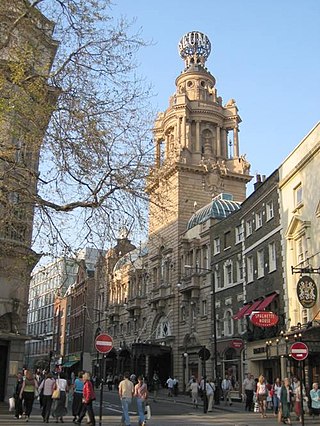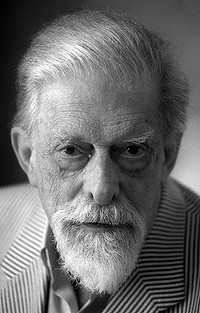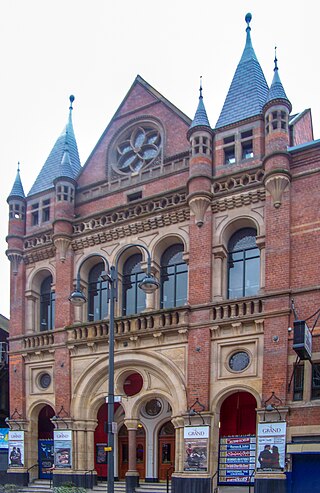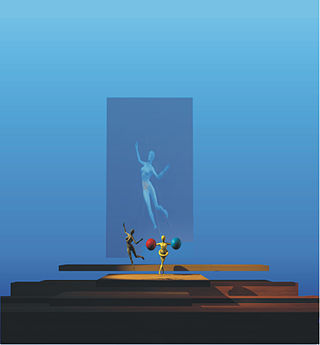Related Research Articles

English National Opera (ENO) is a British opera company based in London, resident at the London Coliseum in St Martin's Lane. It is one of the two principal opera companies in London, along with The Royal Opera. ENO's productions are sung in English.

George Henry Hubert Lascelles, 7th Earl of Harewood, styled The Honourable George Lascelles before 1929 and Viscount Lascelles between 1929 and 1947, was a British classical music administrator and author, and a member of the extended British Royal Family, as a maternal grandson of King George V and Queen Mary, and thus a first-cousin of Queen Elizabeth II. He served as director of the Royal Opera House, chairman of the board of the English National Opera (ENO) (1986–1995); managing director of the ENO (1972–1985), managing director of the English National Opera North (1978–81), governor of the BBC (1985–1987), and president of the British Board of Film Classification (1985–1996).
Welsh National Opera (WNO) is an opera company based in Cardiff, Wales. WNO gave its first performances in 1946. The company began as a mainly amateur body and transformed into an all-professional ensemble by 1973. In its early days, the company gave a single week's annual season in Cardiff, gradually extending its schedule to become an all-year-round operation, with its own salaried chorus and orchestra. It has been described by The New York Times as "one of the finest operatic ensembles in Europe".

Opera North is an English opera company based in Leeds. The company's home theatre is the Leeds Grand Theatre, but it also presents regular seasons in several other cities, at the Theatre Royal, Nottingham, the Lowry Centre, Salford Quays and the Theatre Royal, Newcastle. The company's orchestra, the Orchestra of Opera North, regularly performs and records in its own right. Operas are performed either in English translation or in the original language of the libretto, in the latter case usually with surtitles.
Sir Simon Keenlyside is a British baritone who has performed in operas and concerts since the mid-1980s.

Les Mamelles de Tirésias is an opéra bouffe by Francis Poulenc, in a prologue and two acts based on the eponymous play by Guillaume Apollinaire. The opera was written in 1945 and first performed in 1947. Apollinaire's play, written in 1903, was revised with a sombre prologue by the time it premiered during World War I in France. For the opera, Poulenc incorporated both the farcical and the serious aspects of the original play, which according to one critic displays a "high-spirited topsy-turveydom" that conceals "a deeper and sadder theme – the need to repopulate and rediscover a France ravaged by war."
Washington National Opera (WNO) is an American opera company in Washington, D.C. Formerly the Opera Society of Washington and the Washington Opera, the company received Congressional designation as the National Opera Company in 2000. Performances are now given in the Opera House of the John F. Kennedy Center for the Performing Arts.
The English Opera Group was a small company of British musicians formed in 1947 by the composer Benjamin Britten for the purpose of presenting his and other, primarily British, composers' operatic works. The group later expanded to present larger-scale works, and was renamed the English Music Theatre Company. The organisation produced its last opera and ceased to run in 1980.
David Matthias Lloyd-Jones was a British conductor who specialised in British and Russian music. In 1978 he was a co-founder of Opera North, conducting 50 productions during the 12 years he was there, and was also an editor and translator, especially of Russian operas.
John Dexter was an English theatre, opera and film director.
Steven Charles Pimlott was an English opera and theatre director, whose obituary in The Times hailed him as "one of the most versatile and inventive theatre directors of his generation". His output ran the gamut of the theatrical and operatic repertoire, from musicals, such as Joseph and the Amazing Technicolour Dreamcoat, and popular plays, such as Agatha Christie's And Then There Were None, through classics such as Shakespeare and Molière, to Stephen Sondheim and James Lapine's Sunday in the Park with George and Alexander Borodin's Prince Igor.
Richard Van Allan CBE was a versatile British operatic bass singer who had a lengthy career.

Oedipus rex is an opera-oratorio by Igor Stravinsky, scored for orchestra, speaker, soloists, and male chorus. The libretto, based on Sophocles's tragedy, was written by Jean Cocteau in French and then translated by Abbé Jean Daniélou into Latin; the narration, however, is performed in the language of the audience.
Opera North is an opera company based at the Grand Theatre, Leeds, England. This article covers the period between the severing of its ties with English National Opera and the departure of its founding music director David Lloyd-Jones.
Opera North is an opera company based at The Grand Theatre, Leeds, England. This article covers the period when the company's music director was Paul Daniel.
Opera North is an opera company based at The Grand Theatre, Leeds, England. This article covers the period between the departure of Paul Daniel and the arrival of Richard Farnes.
Opera North is an opera company based at The Grand Theatre, Leeds, England. This article covers the period during which the Music Director has been Richard Farnes.
Martin McEvoy is an English opera singer, producer, presenter and broadcaster. He has specialised in playing light baritone roles in opera and operetta especially those in the Gilbert & Sullivan repertoire. He broadcasts regularly on BBC Radio. McEvoy is the founder and artistic director of Crystal Clear Opera, London City Opera and Martin McEvoy Productions.
The New Opera Company was a British opera company active during the period 1956 to 1984. It was mainly based at Sadler's Wells Theatre, London and later worked in co-ordination with English National Opera. The company was responsible for the premieres or major revivals of important work in the operatic canon.
Sheri Greenawald is an American soprano and music educator who had a performance career in concerts and operas during the second half of the 20th century and early 21st century. She has portrayed principal roles in the world premieres of several operas, including works by composers Leonard Bernstein, Daniel Catán, Carlisle Floyd, Thomas Pasatieri, and Stephen Paulus. She has performed leading roles with opera companies in the US and abroad, including the Metropolitan Opera, Lyric Opera of Chicago, Houston Grand Opera, Bavarian State Opera, La Fenice, and Paris Opera. She was particularly active as a performer with the Santa Fe Opera and San Francisco Opera. A former member of the voice faculty at the Boston Conservatory, she served as director of the San Francisco Opera Center from 2002 through 2020.
References
- ↑ Leeds Classical Music: English National Opera North
- ↑ "Main stage" means operas performed at Leeds Grand Theatre and a number of touring venues; small-scale productions are not included. Semi-staged concert performances at Leeds Town Hall and other similar venues are included, but concert performances without any staging are not.
- ↑ Titles in Bold are new productions. Unbolded titles that are not revivals of Opera North productions are productions that originated at English National Opera, Scottish Opera, Welsh National Opera and Glyndebourne Festival Opera. Opera titles are the titles used in Wikipedia articles and not necessarily those used by Opera North.
- ↑ Where two designers are credited, the first-named designed the set and the second designed the costumes
- ↑ Performed as a double-bill with Dido and Aeneas
- ↑ Performed as a double-bill with Les mamelles de Tirésias
- ↑ Performed as a double-bill with Les mamelles de Tirésias
- ↑ Performed as a double-bill with Oedipus rex